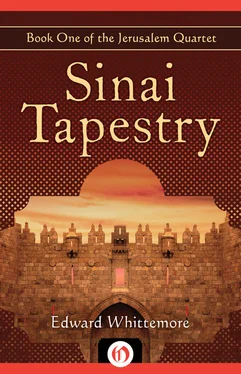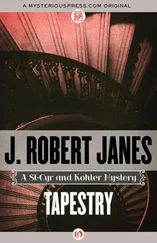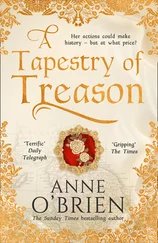The hakïm went on with his cures until the end of the day, when he sat alone and wondered at the sameness of these replies. Since so many people knew of the lost book, could it be they were all secret contributors to it? That the lost original could thus be retrieved only by probing the hypnotic trances of everyone on earth?
The hakïm reeled under the weight of this revelation. The truth was staggering, the task without hope. For the first, time in his life he felt helpless.
Bleakly he recalled his decades of ceaseless wandering through tides of sand in the wake of the moon in search of a holy place once mentioned by Father Yakouba. The memory of that serene and gentle dwarf now filled him with a terrible sadness, for his haj was over and he knew he hadn’t found his holy place. Why had he failed? Where were the footprints in the sky?
Enormous and solitary in the twilight, the greatest explorer of his age sank to his knees and gazed slowly around at the shadows, lost and knowing he was lost, remaining there until a young man approached him at dawn.
O revered hakïm?
Yes, my child.
I am sick and weary.
Yes, my child.
Can you help me, as they say you can?
Yes. Sit now and turn your back and fix your eyes on that distant eagle as he swoops and soars in the first light of day living a thousand years. Are we able to follow such paths? Could it be his flight traces the journey of the Prophet, the actual footsteps a man takes from the day of his birth to the day of his death? The swirls of the Koran shape and unshape themselves as do the waves in the desert and yes the oasis may be small. But yes, we will find it.
One afternoon a shepherd watched the hakïm healing on a hillside in the Yemen and came to him when he was finished. He was a small plump man given to continual smiles who waddled more than walked. The waddle carried him along the hillside where he stood dancing from one leg to the other.
Salaam aleikoum, respected hakïm. And who might you be?
Aleikoum es-salaam, brother. A man astray.
Ah but we’re all astray, yet isn’t it also written that each man has an appointed place?
It is, and also that man knows not in what country he must die. Now what is it that ails you, brother?
So businesslike, hakïm, but you see it’s not me. I only have the usual aches to be cured when that day arrives. It’s you I’ve come to talk about.
Me, brother?
Yes. You’re ailing and no one likes to see a kindly man ail.
As you said, when that day arrives.
No no, hakïm, I didn’t mean that at all. But won’t you come to my tent for coffee? The day’s over and it’s time to leave the dust. Won’t you come along now? Come.
The little man tugged the hakïm’s sleeve and when the hakïm rose the little man laughed loudly.
What is it?
Why the two of us, don’t you see? When you were sitting I was as tall as you but now suddenly I’m only half as tall. What’s to be done? Must a hakïm always sit while a poor shepherd always stands? A marvel, that’s what it is.
What?
His variety, His gifts. But come, brother, as you call me, the day’s over and there’s good coffee to drink. Yes come at once. Ya’qub is my name, come.
He laughed again and they started off, the tall gaunt hakïm dignified despite his rags, the short plump shepherd humming happily as he skipped along trying to match the solemn strides of the man he had come to lead home.
The hakïm arranged his rags, Ya’qub made coffee. And now the little man’s face was serious and his voice urgent.
I’ve watched you curing the sick with your eyes, hakïm, and it’s good work you do. But don’t you know your own eyes can be read as well? They can and today I read them. Would it be wrong to say you’ve traveled so much you’ve seen everything?
It may be so.
And that these things you’ve seen and done no longer interest you?
That’s true.
Yes of course, because you’re growing old like me. But we’re not really that old, hakïm, only sixty and a little more, not much of anything. And isn’t it also true you’re very rich? Not at all the poor man you appear to be?
How’s that, brother?
Here I mean, in your heart, because you’ve seen so much. Isn’t it true you’re one of the richest men in the world? Perhaps the richest of all?
It may be.
No no, sadly for you it isn’t true. You certainly should be but you’re not at all. And when you said before you’d seen everything, that wasn’t true either. You’re a good man and kind but a sickness has come to you in the second half of your life.
I grow old, that’s all.
No no it’s not age, it’s something else. With all your travels and your wisdom don’t you know it? Don’t you see it with those powerful eyes of yours, you who see so much in everyone else? Well if you don’t I’ll have to tell you. It’s loneliness, hakïm, that’s your sickness. You’re all alone. Haven’t you ever loved a woman and had a child?
The first but not the second.
You mean you have loved a woman?
Yes.
But it was long ago in some faraway place?
Yes.
But how long ago, simply years and years? A very long time?
If forty years is a long time, yes.
And this faraway place, would it be strange to a poor shepherd from the Yemen?
It might be strange, yes.
You mean it has palaces and fountains and elephants? These and other wonders without count? All that and more? What could such a place be called?
Persia.
The little man clapped his hands and now all the gravity was gone from his face. He laughed and hugged himself.
Oh I’ve heard of it, hakïm, I’ve certainly heard of Persia with its elephants and fountains and palaces but I’ve never known anyone who’s been there. So won’t you tell me all about it? About the woman too? It’s good for men of our years to recall love, nothing is better save to have that love still. So please tell me everything, hakïm. This is rich news you bring to my hillside.
Yes yes, he whispered, jumping to his feet and scurrying around the tent searching in vain for more coffee to boil, bumping into a lamp in his haste and knocking it over, laughing at the lamp and bumping into the tent poles and laughing at them, finding coffee at last and seating himself with great pleasure, rocking and smiling and wrapping his stubby arms around his body as if to feel the joy that would be his with a story of love and Persia.
The tale Ya’qub heard wasn’t at all what he had expected. The hakïm began slowly, for once unsure what he was going to say, not even sure why he was telling this stranger about the gentle Persian girl he had once known for a few weeks, no more, before she died in an epidemic and he too had fallen ill and been partially blind for a time, memorizing the Koran in his sadness and becoming a Master Sufi before moving on to encompass the rituals of a thousand tribes.
As Ya’qub listened to this tall gaunt man he realized he wasn’t merely a hakïm no matter how good and powerful, but a wanderer who had been many men in many places, a figure disguised in many robes, truly a vast and changeable spirit.
A genie?
Yes a genie, but that was before. Now he was a man with a sickness.
Ya’qub listened to his guest and watched his eyes. He nodded when the hakïm ended.
You’re deaf?
Yes.
No matter. Anyone can be deaf or something else and all men are.
Only one other person has ever guessed that.
And he heard it too, just as I did, and of course his name was also Ya’qub, wasn’t it?
Yes, but why?
But why and why? repeated Ya’qub happily. How could it be otherwise? When things are a certain way that’s the way they have to be. But you’re smiling now, hakïm, and why is that? How can a man who’s done nothing and been nowhere make you smile? And there was more to your wandering than just wandering, wasn’t there? All that time when you were pretending to be on a haj you were really looking for a lost book, isn’t it so? The story of the gentle Persian girl was in it but also other things and that’s why you picked up so many jokes and riddles and scraps of rhymes in so many holy places. Admit it, because you thought they were also part of the book.
Читать дальше












